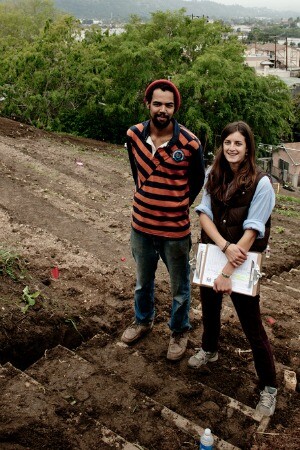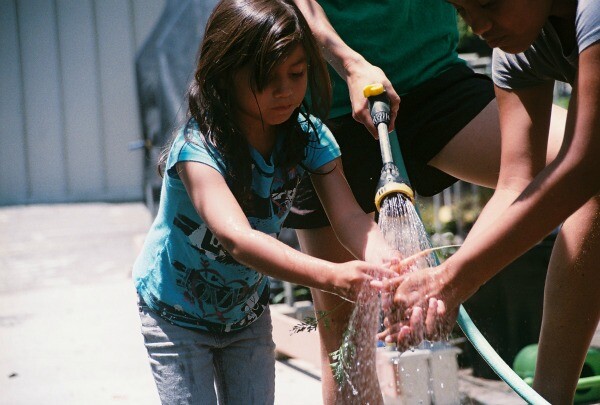The Art of Young Folks Urban Farm

Climb up the stairs of the Los Angeles Leadership Academy's hillside school farm for a view of downtown L.A. and a hillside full growing food. The smell of fresh tomatoes and herbs fills the air. It's a remarkable urban experience, and it's the creation of Julia Carr and Dan Lawler of Young Folks Urban Farmers.
There is a certain urgency to Dan and Julia's work -- there is always something that needs to be done on their ever-expanding school farm (half an acre and still growing). The very serious need for programs like theirs in schools is well known. But despite the demands of running a large-scale urban farm, Julia and Dan project calm. This passionate, down-to-earth pair, are in large part responsible for the transformation of their students' eating habits. They spoke with me about the challenges of running a hillside farm, what's next for the program, and why there is a need to focus on the basic building blocks of the good food movement in Los Angeles.
After a year of cultivating their hillside farm (where they grow several varietals of basil, kale, beans, and peppers) and teaching students about agriculture, nutrition, and cooking (they launched in 2011, both mentored by the "Eastside Tomato King" Cam Slocum), Julia and Dan took their program a step further with the creation of an urban farming summer camp. I was lucky enough to help create the curriculum for the summer camp, which hosted 30 students over a three week period. The students learned about agriculture and the food system, took home fresh fruits and vegetables, spent a day at the Soledad Goats farm, and even used a mixture of earth and seeds to create seed bombs. Over the course of the week, students became conscious of the unhealthy ingredients in soda, took a look at child-targeted junk-food advertising, and even learned how to make goat cheese.
While the camp focused on eating healthy, organic, local foods, "some kids would show up with Coca-Cola that mom packed for lunch, directly complicating all the education and progress we were offering," says Dan. Dan also says he realized that "there needs to be a unified message at home and at school about the benefits of eating healthy, eating organic when you can, and becoming conscious of their [the students'] being." A second realization was the finding that even in a short amount of time -- like their one-week summer camp, which met for only a few hours each day -- "kids are actually very receptive to changing their habits and really do have the power to change their families from the bottom up."

And while the perks of working on a school farm are great (fresh produce, fresh flowers, and serious karma points), running a half-acre uphill farm is no piece of (local, organic) cake. When asked about the challenges of running the farm, Dan and Julia describe patience as the most challenging aspect of farming. More specifically, they cited the uphill battle (literally!) of working on an hillside farm as their biggest challenge. Julia and Dan were also keen on revealing the meaning behind their name, Young Folks, which comes from a song by Peter, Bjorn, and John. "I thought it would be fresh to introduce this new angle, that the world is still young and humans are just now becoming cognizant of the power of humanity and how it relates to our environment... [an] environment that, at one point in history, was sacrificed for the sake of industrialism and led us to this exhausting juggernaut that is late capitalism," Dan said in an email.

When it comes to the current state of the good food movement in Los Angeles, Dan was critical of the strong focus on the macro. "[There] is this want to build something significant and influential with farm, garden, and food projects, but I think everyone is focusing too hard on the bigger more complex ideas, and less people, with less power are focusing on the basic building blocks of a movement. More resources need to be devoted to nurturing the movement in its infantile state."
Dan and Julia always manage to touch upon the subject of this movement with emotion and a fresh perspective that makes them stand out. It's no different when it comes to their philosophies around farming. "Our philosophies around growing food are similar, but different," says Dan. "Julia is more interested in the humanist, family oriented, and environmentalist aspects of growing food with others. I personally do it as a political and artistic statement. Art can be anything the artist makes it; it can be useful or wasteful, beautiful or ugly, political or apolitical. I like useful art; art with a significant message or a function. Combined with my interest in community building and grassroots political activism, it seemed fairly obvious to me that growing vegetables was a very functional usage of my creative expression. Besides that, I'm also a big softy, and I want nothing more than to nurture others, and some of us have to make that our art; more of us should, at least."
Whether it's art or food they're creating, L.A. needs what they're doing.